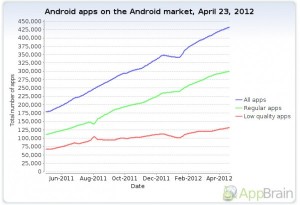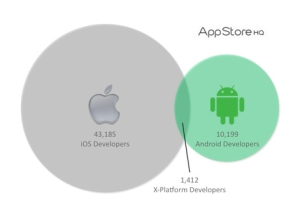Looking at both the Apple walled garden approach to development for their mobile devices, it is tempting to simply say that it is stifling creativity, because the apps need to be approved for sale before they get installed into devices.
However is it?
The advantages of a walled garden are simple: Create a cost for the developer, and you automatically filter out the ones that are not serious about the product they are making.
The Apple Store and Apple products also have one key advantage. Apple devices already have credit card details available. A developer is far more easily assured of getting an income from their work, because there is already a payment system that the consumers of Apple products are used to.
Also, they have been around a lot longer. The Play Store (formerly Android Marketplace) is a comparatively new development.
The result: Apple still has a far larger number of developers:
There is also another problem. By abandoning control over the content, the door has been left open for a large number of low quality apps. Apps that do one thing, and do it poorly.

And the best apps are generally hosted by both operating systems anyway.
The walled garden environment keeps out the poor quality apps. When Apple must give its approval, then the developers have to work hard to bring their apps up to scratch. And it also keeps out things like malware and pornography.
In the walled garden analogy, it is a garden where the gardeners are not allowed to bring weeds in, and are not allowed to trim the hedges into certain shapes. Within those strictures, anything goes.
But, unless you want specific benefits of either platform, there is not really all that much difference on the consumer end. With the Apple operating system, you get stability, with the Android system you are able to get things like pornography which are not available on the Iphone.
Question: How are mobile phones being used in the developing world?
The mobile phone is an equaliser. They require very little by the way of infrastructure. A cellphone tower can cover a large area, without having to lay any cables or optical fibres. Before the advent of the mobile phone, such services were simply not available, even to wealthy people in places like the favelas of Brazil. The government and utility services simply did not reach them.
So, they have been able to use stolen, hacked and legally bought phones where they could not buy them before. And they use them in ways that people in the West were using them. For example, “beeping”, where you dial a phone and then hang up. This is a good way to get the attention of a caller, so they can either call you back or simply go to a prearranged location or take any other prearranged action. They are also used as a defacto public phone. One telephone can service a wide community, with customers of the owner of such a phone paying the owner a fee to make calls.
